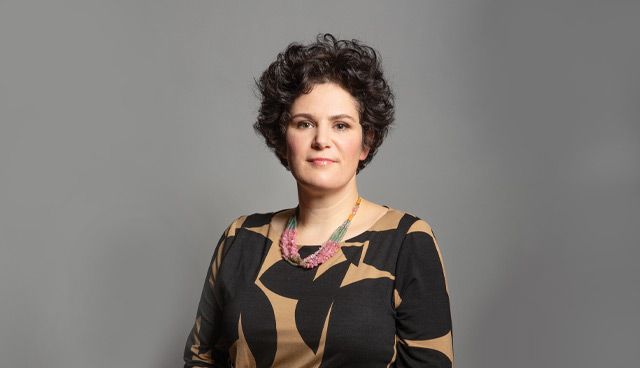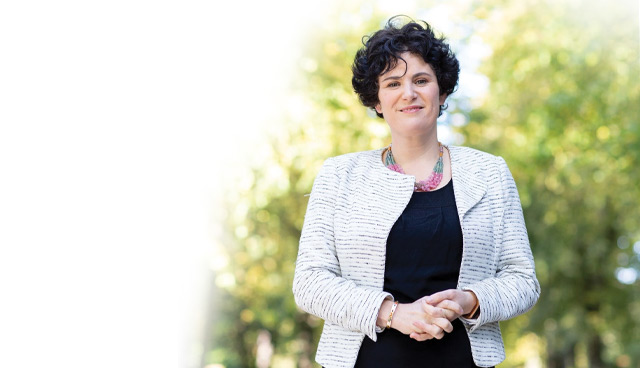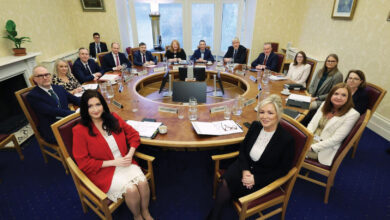Claire Hanna MP

David Whelan talks to South Belfast MP Claire Hanna about her adaptation to life at Westminster, the threat still posed by Brexit and the return of the Northern Ireland Assembly.
Following SDLP MP Claire Hanna through the corridors of Stormont as she searches for an empty room in which to conduct our conversation, it’s easy to reflect on the much changed political landscape which saw her elected to Westminster at the end of 2019.
Most obviously, Hanna’s old room has been reassigned. Three years of stalemate at Assembly and Executive level is replaced with the hum of activity, as MLAs resume their ‘normal’ business.
Hanna was one of those MLAs left frustrated at the Assembly’s lengthy absence and this, coupled with the perceived threat of Brexit, was undoubtedly a factor in her decision to contest for a seat in the House of Commons.
Hanna fought the December 2019 Westminster election for the SDLP primarily as a Brexit opponent and her unifying call to elect a pro-remain voice for Northern Ireland to Westminster saw her oust the DUP’s sitting MP Emma Little-Pengelly in South Belfast by more than 15,000 votes, in what was initially billed as a tight contest.
However, like that of others who successfully fought for a seat in Westminster in opposition to Brexit, Hanna’s victory was somewhat tainted by the sizeable majority attained in Britain by Boris Johnson’s Conservative Party, making Brexit on 31 January 2020 an inevitability.
Speaking in early February, the new MP admits that she is “still getting to grips” with the procedural differences between Westminster and Stormont, while also building relationships and assessing where change can be best affected.
“There has been a real interest in Northern Ireland and people appear happy to see a balance of opinion from here. However, it’s hard to shake the feeling that we could have affected greater change two and a half years ago when the Brexit battle was more alive,” she states.
The MP takes the approach that casting a broad net is more advantageous than simply aligning with like-minded MPs. She describes the Labour Party as her “political home” in relation to Westminster but demonstrates her desire to work across areas of common interest. As an example, Hanna highlights early engagement with the SNP and Caroline Lucas of the Green Party, including her co-sponsoring SNP MP Peter Grant’s Bill to “protect the NHS from a post-Brexit trade deal with the US and require consent from the Northern Ireland Assembly for any deal that undermines the principle of a publicly owned, operated and commissioned NHS”.
“I’m open to learning from other people,” she adds. “I see MPs that are really good at what they do and I’m doing my best to model that.”
However, there is a sense that the MP is not willing to throw herself completely into life at Westminster. Prior to our meeting, Hanna had co-chaired the all-party group (APG) on childcare in Parliament Buildings, a policy issue that she is invested in. Her working week remains fluid, but she outlines a desire to spend Mondays at Stormont, describing Belfast as “still the centre of gravity for us”. Like other MPs, the publicly accessible Hanna will also dedicate her Friday’s to constituency work.
The former MLA retains an ambition to play a role in adding value to a new Programme for Government for Northern Ireland, including on issues in which she has particular interest, namely reconciliation, sustainability and support for the arts, which she believes have been neglected in the past.
Hanna dismisses the suggestion that her active and well-regarded style of political representation may be better suited to the re-established Assembly rather than a Conservative Party dominated Parliament in London.
“There is a need for representation at all levels and this is the way the ball bounced,” she says. “Any political forum is what you make of it. I’m not planning to disappear from the local scene but there are many big issues still set in Westminster in terms of top line policy and there are high level political conversations to be had around operationalising the Good Friday Agreement, which Westminster has a big part in.
“I really enjoyed being an MLA. I desperately wanted Stormont back and I’m glad that it is. However, I’m also happy where I am now and I’m confident in my great colleagues across the Assembly and local councils.
“We’re determined to use all of the political levers available to us in implementing new creative ideas. For many years Northern Ireland has just cut and pasted policy and governance without meaningfully changing people’s lives.”
New Decade, New Approach
The MP does not accept that the New Decade, New Approach deal, a draft of which was drawn up by Ireland’s Foreign Affairs Minister and the UK’s Secretary of State to Northern Ireland for the main parties to fall in behind, represents a similar ‘cut and paste approach’.
“I can see the fingerprints of party colleagues such as Nichola Mallon and Colum Eastwood all over that document in terms of things like third level education, decent employment, childcare and action on climate. Things that we have tried to lead in for the last few years and which could have fallen by the wayside. I didn’t sense an enormous appetite from the larger parties to get into those, had they not been fought for.
I really enjoyed being an MLA. I desperately wanted Stormont back and I’m glad that it is. However, I’m also happy where I am now and I’m confident in my great colleagues across the Assembly and local councils.
“It’s good to get the bare bones of a deal but as always the devil will be in the detail,” she adds. Emphasising her point, Hanna welcomes planned progress on a childcare strategy but believes it is limited in its age range. “We have to take a broad approach and while I appreciate the Executive will want quick wins and to be seen to be delivering change, we have a moment where it’s important to be meaningful with the consensus that we have.”
Hanna’s nomination as the SDLP candidate to contest the South Belfast MP seat was to some degree surprising given her public opposition to the party’s official policy partnership with Fianna Fáil at the start of 2019. As a result, Hanna resigned the party whip and stepped down as the SDLP’s Brexit spokesperson, leading some to speculate that Hanna might find a new ‘political home’.
“My political home is the Social Democratic and Labour Party and has been for 20 years,” she attests.
“My views have never changed. I believe in the widest possible political relationships and I think where Northern Ireland is now, it’s important to have good relationships with excellent representatives in all of the parties in the South. There are TDs, senators and councillors in all parties which I think have a real contribution to make to North-South relationships and others, and I want to work with them.”
Hanna’s decision to work across a broad base has brought criticism, particularly online and sometimes in an abusive manner. In the run up to the General Election in the Republic of Ireland in February, Hanna canvassed for prospective TDs of both Labour and Fine Gael, while SDLP colleagues canvassed for the party’s official partner Fianna Fáil. There was a notable reaction online, much of which was negative, and which struck a similar chord to the abuse highlighted by a number of politicians in recent months, particularly females.
Addressing this, Hanna says: “There is definitely a gender dimension to a lot of the abuse, even as far back as the policing [flag] protests in Northern Ireland when my home and that of Naomi Long was attacked. Some of the discourse and language used on twitter is toxic and a real deterrent.”
18 female MPs did not seek re-election in December’s 2019 General Election, many citing abuse threats and a culture of intimidation as their reason. Hanna herself admits to sometimes not posting something she feels is important online if she is not in the mindset to deal with an inevitable backlash.
“It’s bad for democracy and for encouraging people to participate. We all have to work together to purge that type of discourse but also not let it effect how you conduct your business,” she states.
The MP believes that political parties have a leadership role and can set standards in relation to improving the current environment for discourse.
Brexit
Returning to the body of work before her, Hanna says there is still much to do and again emphasises a “regret” that MPs from Northern Ireland “could have delivered a much softer Brexit and/or the backstop”. Doing so, would have reduced the current challenges being faced in terms of east-west trade, she states.
“There is a lot of detailed work going to be required to ensure the appropriate operation of the Northern Ireland protocol but also the future relationship. A trade deal between the UK and the EU is going to define how that east-west movement happens. Ultimately, the softer the Brexit the fewer the barriers and while some of that will take place at inter-governmental level, clearly MPs have a role in reflecting the opinions and concerns of who they represent.”
Hanna also believes she has a role in giving a voice to the many local experts in fields such as business, human rights, academia and others, who understand the impact and to ensure that this is heard in the UK Government and the EU.
While much of the Brexit emphasis, which swept throughout the 2019 General Election, appears to have subsided following the UK’s exit on 31 January, Hanna stresses the importance of awareness that the UK is not yet beyond a hard Brexit.
“The simplicity of getting Brexit done appealed to people who, wherever they sat in the debate, were desperate to stop hearing and talking about it. Unfortunately, there is another cliff edge at the end of this calendar year and a hard Brexit, along with all that that could mean for workers’ rights, standards, environmental protections and the economy generally.”
Brexit still has consequences and the harder it gets, the harder the consequences.
Whilst mitigations now exist to avoid the feared return of a hard border in Ireland, Hanna stresses: “Brexit still has consequences and the harder it gets, the harder the consequences.”
To this end, she outlines an ambition to spearhead a new all-party group (APG) on the Good Friday Agreement in Westminster, with the ambition to bring greater education and understanding of the Agreement to MPs.
Explaining its relevance, she says: “We are entering a decade where there may well be major constitutional change and it’s important to keep a handle on that and to ensure it happens in a manageable and controlled way. It’s not simply an APG on Ireland, it’s about broader relationships and ensuring that whatever constitutional and societal changes occur, that they happen in a way that we understand each other, and this is a forum for a lot of that discussion.”
Hanna has also committed to a number of other APGs including taking part in the all-party parliamentary group on Queen’s University Belfast and on one on sustainable finance which covers a wide range from more ethical and sustainable pension contributions to regulation of the finance industry. Hanna also lists involvement in the climate APG and an APG supporting arts in the creative industries.
While the advent of Brexit in January may have pushed the issue from the public discourse, Hanna affirms that it will continue to represent the bulk of her work as an MP as she seeks to impress upon MPs across the House of Commons the need to mitigate against barriers to trade and the further implications of Brexit for Northern Ireland.
This she emphasised from the outset of her maiden speech in December 2019. “Brexit is an emergency and I was elected to do all I can to mitigate the impact of Brexit for the people I represent,” she told MPs.






